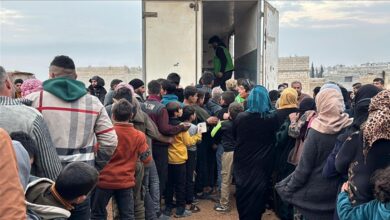
United Nations: Syria is still stuck in a spiral of rapid deterioration of the humanitarian situation
The United Nations Under-Secretary-General for Humanitarian Affairs, Martin Griffiths, warned that “Syria is still stuck in a spiral of rapid deterioration,” which makes it “a place of tragedy, as long as the conflict continues.”
Griffiths said in a briefing to the Security Council, yesterday, Wednesday, September 15, that “the humanitarian needs in Syria are greater than they have ever been.
“After a visit to the region at the end of last August, during which he held “frank and constructive discussions” with Turkish presidential spokesman Ibrahim Kalin and Turkish Deputy Foreign Minister Sadat Unal, as well as Assad’s Foreign Minister Faisal Miqdad and his deputy Bashar al-Jaafari, Griffiths assessed “a need for13.4 million Syrians across the country received humanitarian aid, noting that this constitutes an increase of 21% over last year, and it is the highest percentage since 2017.
He pointed out in this regard, that: “The lived reality is more severe than the numbers can describe.”
The UN official conveyed the demands of Syrians he met during his last visit, for access to education, health care, and fuel to survive the coming winter.
Griffiths noted that: “The United Nations humanitarian response plan for Syria, worth $4.2 billion annually, is the largest in the world, but it is funded only by 27%, which means that about a quarter of those in need in Syria will have the opportunity to meet their needs.
He added that, “even if this total increases in the coming months, through the response and generosity of donors, which I hope will happen, the funding is not keeping pace with the growing needs of the Syrians.
Griffiths called on the United Nations and its partners to provide “more and more” support to the Syrians to put them on the path to recovery, stressing the importance of new programs that focus on early recovery.
He pointed to the deterioration of the food security situation in the months of June and July after a slight improvement in the months of April and May, indicating that the rise in prices of basic commodities and the loss of livelihoods forced more families to reduce meals.




